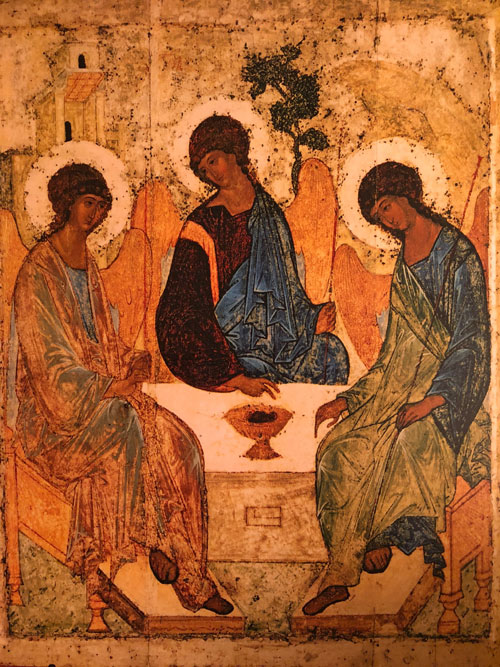Thanksgiving, 2017
Dear Friends in Christ,
As a small child, I spent more than one Thanksgiving at the home of my grandparents in Booneville, Arkansas. I have fond memories – my grandfather in his huge overstuffed chair, his slippered feet up on an ottoman, stuffing his pipe with Prince Albert, while nearby a grandfather clock (of course) soberly ticked out the time; the deep, claw-footed bathtub that one could easily drown in; the polished wood floors and stair treads that were so slick we were told not to wear socks coming down the steps from our bedrooms, lest we fall (I fell, spectacularly, more than once). It all felt more like home than my own home, and I miss it, as I think of it now.
Best of all was the huge table which on the holiday filled with more relatives than I ever knew I had. My goal, in which I competed with my cousins, was to be seated next to my Aunt Lillian, my dad's stepsister, who was always winking and smiling at me, who listened to every word I said and answered all my questions, who squeezed my hand and called me Sugar, and might even slip me a piece of Juicy Fruit under the table, if I was really good.
Sometimes that didn't happen and I was seated instead next to my great-uncle Buell. He was an undertaker. He was a good and gentle man, but he was large and ungainly, and a little morose, and awkward with children. He always smelled faintly the way his funeral parlor smelled – of lilac and mortician's wax. He never looked at me, so from my seat for the whole meal I could stare straight up his nose, a sight that would give any child a nightmare. When I was next to Uncle Buell, I felt uneasy, small and alone, not because of anything he said or did, but because I was small and alone.
It's funny how these early experiences project themselves into our later lives. We can be at the Thanksgiving table, reasonably happy, surrounded by family, some of whom we delight in, and some of whom weigh on us, but on the whole enjoying ourselves – until someone says something pointed, or awkward, or mean, or someone ignores us or treats us impatiently, and in a moment we are six again, feeling hurt and distant. In that moment, you need a way back to what home would look like if we all weren't such a mess.
 There is a beautiful and very famous icon often called The Old Testament Trinity, by the 15th century Russian master Andrei Rublev. It is based on the story of the strange messengers who visit Abraham by the oak of Mamre (Genesis 18:1-8), but Rublev re-imagines the scene as God Himself, Father, Son, and Spirit, seated at a table, in perfect divine communion. In the foreground is an empty place – for you. You are invited to take your seat in the midst of the Divine Life. In fact, the composition suggests that the table is incomplete without you. Here is the place you have been waiting for, a love and a welcome next to which even the smile of Aunt Lillian pales in comparison.
There is a beautiful and very famous icon often called The Old Testament Trinity, by the 15th century Russian master Andrei Rublev. It is based on the story of the strange messengers who visit Abraham by the oak of Mamre (Genesis 18:1-8), but Rublev re-imagines the scene as God Himself, Father, Son, and Spirit, seated at a table, in perfect divine communion. In the foreground is an empty place – for you. You are invited to take your seat in the midst of the Divine Life. In fact, the composition suggests that the table is incomplete without you. Here is the place you have been waiting for, a love and a welcome next to which even the smile of Aunt Lillian pales in comparison.
But there is more.
You are invited to bring someone with you. The Psalmist says to God, You spread a table before me in the presence of those who trouble me. (23:5) Love your neighbor and your enemy. Take the hand of the one who haunts you. In prayer, bring to the table your opponent, your accuser, your betrayer, just as Jesus brought Judas, just as Christ brings you. Bring the ungainly and neglectful. Welcome the one you can't stand, pull up a chair next to them, and wait for what God will teach you about love, the love of the Cross.
I pray that this Thanksgiving may be a time for gathering in utter gratitude and joy, but I know as we come to our tables, we may also be reminded of pain and loss. We may hear unkind things, and may say unkind things, and may find ourselves suddenly feeling a long way from home – a home we know must be there, if we only knew how to find it. Even before that recognition comes, can we both in the moment and in prayer, find a way to take the hand of the one who troubles us, of the one whom we have lost and whom we miss, of the one who has wounded us or whom we have wounded, even of the one whom we will never satisfy or please, and can we invite them to the seat prepared for us all by God?
Perhaps as we do so, we may discover that our own tables overflow with the Feast of the Divine Life, for God is gracious and merciful, and He loves humankind.
Faithfully your bishop,

(The Rt. Rev.) Dorsey W.M. McConnell, D.D.
